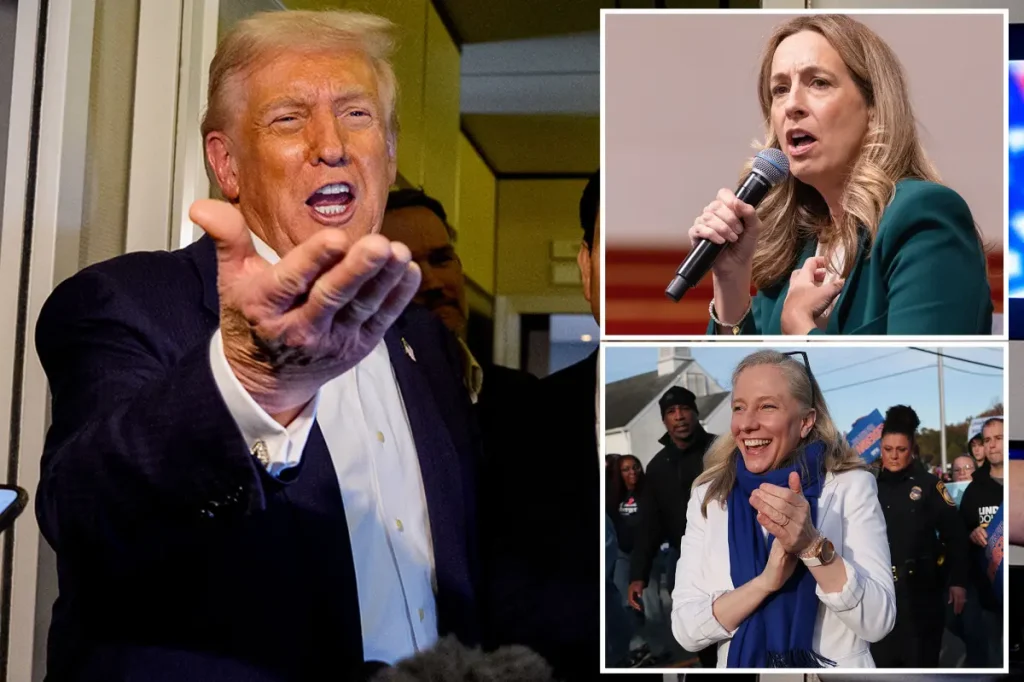Trump’s Warning to New Jersey Voters: A Call for Republican Leadership
In an early morning message on Truth Social, President Trump addressed voters in New Jersey and Virginia with strong warnings about Democratic gubernatorial candidates Mikie Sherrill and Abigail Spanberger. His passionate appeal focused on what he perceives as critical issues facing these states if Democratic leadership continues. Trump questioned why anyone would support candidates who, in his view, promote policies on transgender rights, allow men to compete in women’s sports, fail to address crime, and implement energy policies that lead to high prices. His message reflected the sharp partisan divides that characterize the current political landscape, emphasizing what he sees as fundamental differences between Republican and Democratic governance approaches.
The President placed particular emphasis on energy costs, making bold promises about future gasoline prices under his leadership. “Under President Trump, ME, Gasoline will come down to approximately $2 a Gallon, very soon!” he declared, contrasting this with his prediction that under Democratic leadership, Americans would face significantly higher prices: “$4, $5, and $6 a Gallon.” This economic appeal touches on everyday concerns for many Americans who have experienced fluctuating fuel prices in recent years. Trump positioned energy affordability as a kitchen-table issue that directly impacts quality of life, suggesting that Republican policies would deliver immediate financial relief through “massive Energy Cost reductions, large scale Tax Cuts, and basic Common Sense.”
Trump’s message to New Jersey voters came at a critical juncture, as in-person early voting had just begun in the state. He reserved particular criticism for Rep. Mikie Sherrill, whom he characterized as a “corrupt radical left Democrat” who would be “a travesty as the governor of New Jersey.” This direct attack on Sherrill highlights the high-stakes nature of the gubernatorial race in New Jersey, a traditionally blue state where Republicans see an opportunity for gains. Despite Trump’s forceful criticism, recent polling shows Sherrill maintaining a 5 percentage point lead (50%-45%) over Republican candidate Jack Ciattarelli according to the latest Rutgers-Eagleton poll of likely voters, suggesting that the race remains competitive but leans Democratic.
Beyond specific policy criticisms, Trump’s message employed emotional language designed to create a stark contrast between the futures he envisions under different leadership. He promised that Republican victories would lead to “a great and very affordable life” for citizens, while Democratic governance would deliver only “unrelentingly High Crime, Energy prices through the roof, men playing in women’s sports, and HEARTACHE!” This apocalyptic framing of Democratic policies versus the salvation offered by Republican candidates reflects a campaign strategy focused on heightening voter concerns about cultural and economic issues that have proven motivating to conservative voters in recent elections.
The President’s focus on transgender issues and women’s sports represents an attempt to highlight cultural divides that have become increasingly prominent in American political discourse. By positioning Democrats as advocates who “want transgender for everybody” and support “men playing in women’s sports,” Trump taps into controversies that have generated significant debate across the country. These cultural issues have become important rallying points for conservative voters who feel traditional values are under threat, and Trump’s emphasis suggests he believes these concerns will motivate turnout among his base in these gubernatorial elections.
As election day approaches in both New Jersey and Virginia, Trump’s intervention underscores the nationalization of state-level races and his continued influence within the Republican Party. His direct appeals to voters in these states demonstrate how gubernatorial races have become referendums not just on local issues but on broader national political directions. The stark language and apocalyptic framing used by the President reflect the high-temperature politics that have characterized recent American elections, where voters are increasingly presented with dramatically different visions of the country’s future. Whether Trump’s warnings will resonate with enough voters to overcome Sherrill’s polling advantage remains to be seen, but his messaging makes clear that Republicans will continue to campaign aggressively on issues of energy costs, crime, and cultural concerns in their bid to win governorships in traditionally Democratic-leaning states.











